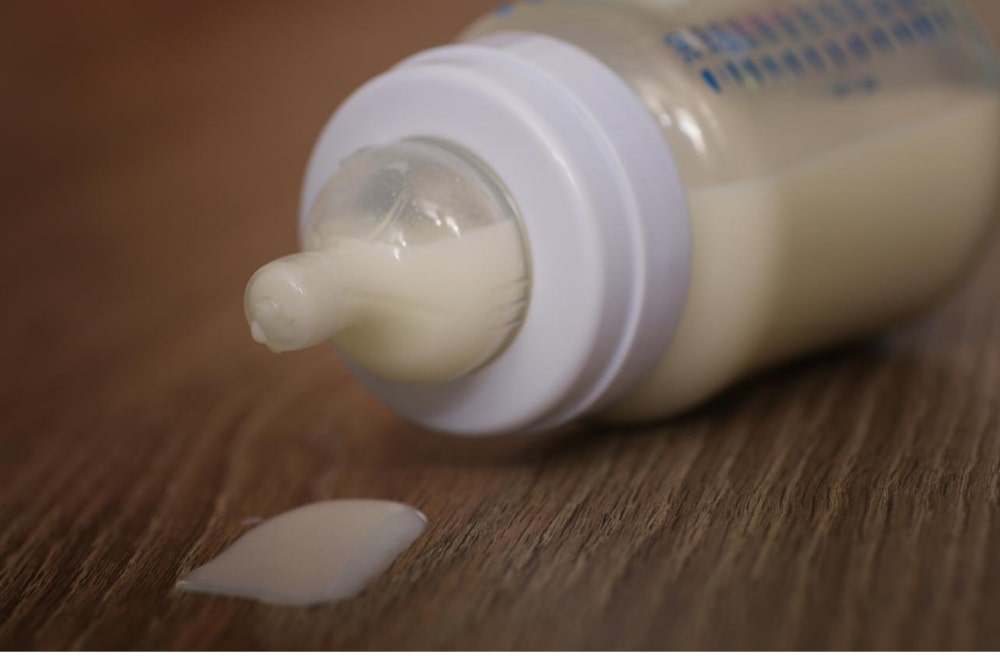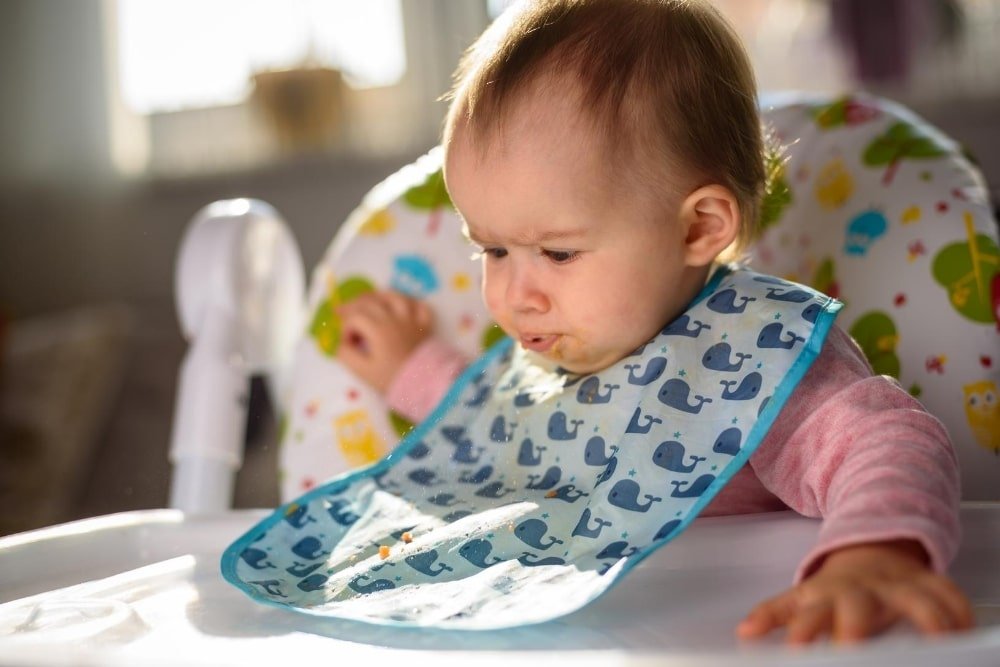Spitting up is quite normal for babies. However, if you’re a parent, it’s essential to know exactly why they do this, how to stop it, and when to be concerned.
If you’re a new mom or dad or someone with a baby on the way, continue reading for more information on what that clear liquid your baby is spitting up is.
What Is This Clear Liquid?
If your baby hasn’t transitioned to solid food, they may still be spitting up a translucent liquid. This can be due to saliva, formula, breastmilk, or a combination of all three. This is often referred to as spit-up, and it will happen to every baby.
In fact, spitting up is so normal in babies under one year old. You should be alarmed if they don’t do it as it’s a part of their digestive system development.
Vomiting can also happen when your baby is drinking their milk too fast. They may still be too young to understand when their tummies are full, so throwing back what their little bodies don’t need is the perfect way for them to learn portion control.
Is There A Difference Between Vomit and Spit-up?
There is a slight difference between these two functions. You can tell just by looking at the liquid. If it’s runny, clear, or milky white, it’s a typical bout of spit-up. If it appears more chunky and clumpy, it’s vomit.
Since a baby is exerting themselves when throwing up — this happens when there’s a forceful expulsion of the content of the baby’s stomach — they will be more irritable as this can be an uncomfortable process.
Regardless, you should have a bump cloth handy after every feeding anyway.
Teething and Spit-up
You may even start to notice your baby spitting up more than usual when they start teething at around five or seven months.
Getting their teeth can be quite unpleasant, so excess drooling or spitting up may be their only way to cope and push through the discomfort.
You can provide chilled teething toys to help them throughout this transition. You can also gently massage your children’s irritated gums with a clean finger wrapped in gauze.
- Soft and Flexible: Unlike other teething toys that are stiff and hard, the ANGELBLISS teethers are carefully made with the perfect texture for chewing and soothing your baby gums. Perfect for assisting in the eruption of front, middle and back teeth. You can also freeze them so they will make your babys teeth more comfortable.
- Multifunction Design- You can teach your baby these fruits while they enjoy looking at the fruit teething toys and grinding their gums on it. Much better option for a baby to look at and easily identify over time to teach them some basic food labeling. The handles are also designed, so the teether keys are very easily to be gripped.
Prices pulled from the Amazon Product Advertising API on:
Product prices and availability are accurate as of the date/time indicated and are subject to change. Any price and availability information displayed on [relevant Amazon Site(s), as applicable] at the time of purchase will apply to the purchase of this product.
How to Stop My Baby from Throwing Up
Breastfeed In Shorter Sessions
View in gallery
If you’re breastfeeding your baby, shrink your sessions down to around five to ten minutes each, as not to overwhelm their sensitive stomach.
Will Giving Them Water Help?
As an adult, it’s normal to assume that your baby needs hydration after throwing up their breakfast. However, this can do more harm than good.
Babies under six months of age should not have water. Their stomachs are quite small and get full fast! Breast milk or formula offers them with the proper nutrients they need to grow. On the other hand, water does nothing for them.
It triggers their appetite and makes them feel full, even if they haven’t eaten anything of substance. This risks the child eventually suffering from a nutritional deficiency, so avoid it.
Furthermore, letting an infant drink water can throw off the nutrients in their blood.
Instead, offer small but frequent amounts of an unflavored oral electrolyte solution every 15–20 minutes with a spoon or an oral syringe. Administer two teaspoons per session. Check with your doctor about which type of solution is best.
Sit Them Up When They Eat
Another way you can cut down on how often your baby is spitting up is to prop them upright when feeding them as this can help soothe their digestive system.
Refrain from putting them in a rocker for thirty minutes after their last feeding session to allow their meal to work its way through their system without any complications.
Turn Your Baby On Their Back During Naptime
Another way you can assist their digestive system is by rolling your baby onto their back when they are asleep. Keeping them on their stomach can place too much pressure on their belly and cause them to vomit!
Don’t Allow Your baby To Overheat
Overheating can be another trigger causing your child to vomit. Therefore, make sure you’re not swaddling them too tightly. Keep your eye on the temperature, and make sure you are dressing them appropriately.
Learn About Infant Acid Reflux
Just like many adults, infants can also suffer from acid reflux. This can happen early on — perhaps just a few weeks into your baby’s life.
It occurs when food backs up from the baby’s stomach and works it’s way back up the esophagus in a process called gastroesophageal reflux or GER. An infant’s all liquid diet doesn’t fare well with this condition either, but you can’t control that.
GER can happen multiple times a day, but is not a sign of anything dangerous and will subside after 18 months of life.
If you’re breastfeeding, eliminate foods like dairy, beef, and eggs since your diet can impact your little one as well. Additionally, ensure you’re using the right size nipple for the baby’s bottle.
View in gallery
One that is either too small or large can cause them to swallow an excess amount of air while feeding, which can lead to acid reflux and spitting up.
Be wary of ear infections and the symptoms
Ear infections can also cause your infant or toddler to throw up. But don’t be alarmed. Like spit up, ear infections are also quite common. Five out of six children will experience one ear infection before their third birthday.
You’ll be able to tell your child has an ear infection if they are:
- throwing up nonstop
- having trouble sleeping
- having issues with their balance
- are constantly running a fever
- having trouble responding to sounds
If you fear your child may have an ear infection, the spread of bacteria should subside after the child is treated with antibiotics. It may take a few days for them to feel like they’re back to normal.
Flu Can Make Your Baby To Throw Up
Having too much clear mucus built up in their noses can also lead to your baby throwing up. This buildup in the throat can also trigger intense coughing, and thus vomiting.
Colds are quite common in a child’s first year of life. In fact, the average child may catch up to seven before turning two!
Be Prepared For The Worst When Burping Your Baby
Babies tend to spit up when they’re being burped. This isn’t a preventative measure, but it will help you out when your baby inevitably spits up that watery liquid on your shoulder. After every feeding, take the proper actions.
- Use a rag as a burp cloth on your shoulder to help with the mess.
- Keep moist baby wipes nearby for cleanup.
- Try not to wear a nice outfit when burping your baby.
How to Stop Baby From Throwing Up At Night?
If your baby is throwing up around bedtime, this can be due to their sleeping position. If their stomach is higher than their esophagus when you lay them down at night, this can trigger the vomit reflex.
Therefore, to counteract this issue, provide your child with some elevation and prop their head up by adjusting their crib. Prop it up with a firm pillow.
- Breathable sequential 3D-air Mesh construction keeps air in the summer and warm air in the winter. Well ventilated 3D Cool Air mesh fabric is used for the back. The front side is 100% Organic Cotton fabric bonded with sponge and it reinforce a sense of durability and cushioning.
- Made from using Organic Cotton Fabric Textiles Cover. Acquired the organic international certification such as GOTS (Global Textile Standard) organic farming certification.
Prices pulled from the Amazon Product Advertising API on:
Product prices and availability are accurate as of the date/time indicated and are subject to change. Any price and availability information displayed on [relevant Amazon Site(s), as applicable] at the time of purchase will apply to the purchase of this product.
Place it under the mattress and never leave bedding or blankets in the crib itself.
Do You Need To See A Doctor?
If the throwing up is accompanied by other symptoms, like a fever or a cough, then this can be a sign that something severe is going on. If you fear your child may be sick, do not hesitate to contact your doctor.
Signs that something is wrong may include the following.
- Your child is having trouble gaining weight.
- Their skin is cold and clammy after throwing up.
- Your baby is struggling to regulate their temperature.
- Your baby also has diarrhea.
- They have been throwing up for hours.
What If My Baby’s Spit-up Isn’t Clear?
Perhaps your child isn’t spitting up clear fluid. If this is the case, here’s what you need to know about your baby vomiting.
View in gallery
They could have a food allergy
As your child grows, they will inevitably try new foods. However, not all of these new foods will sit right with their sensitive stomach.
Other symptoms of food allergies can include hives, swelling, itching, and rashes. If your baby is formula-fed, and having an adverse reaction to dairy, this may cause them to vomit.
Talk to your doctor about switching to a different formulation so that your baby gets the nutrients they need. When introducing solids, keep a close eye on your baby when introducing the top allergens like shellfish, gluten, eggs, and dairy.
Conclusion
Becoming a parent means getting spit-up on now and then. It’s just a fact of life when raising your little ones! However, it does not necessarily cause alarm.
Spitting up translucent liquid is normal and to be expected. If you are concerned about your child, make sure to call your pediatrician right away for answers an internet search alone can’t answer!






